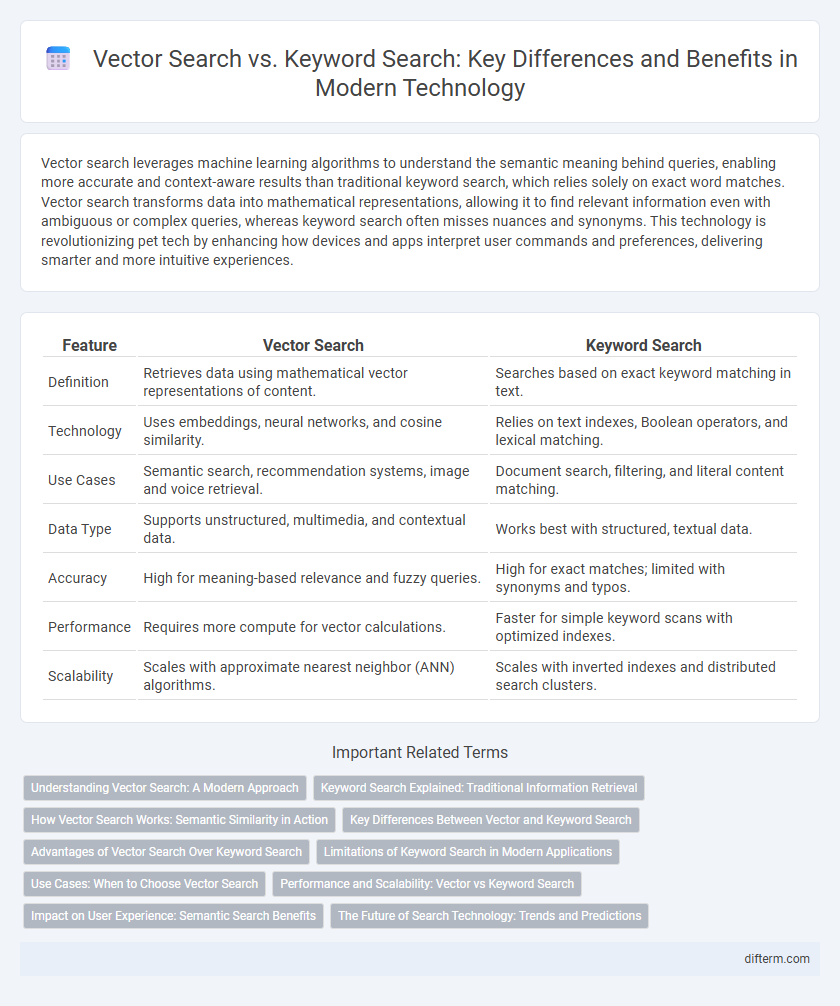Vector search leverages machine learning algorithms to understand the semantic meaning behind queries, enabling more accurate and context-aware results than traditional keyword search, which relies solely on exact word matches. Vector search transforms data into mathematical representations, allowing it to find relevant information even with ambiguous or complex queries, whereas keyword search often misses nuances and synonyms. This technology is revolutionizing pet tech by enhancing how devices and apps interpret user commands and preferences, delivering smarter and more intuitive experiences.
Table of Comparison
| Feature | Vector Search | Keyword Search |
|---|---|---|
| Definition | Retrieves data using mathematical vector representations of content. | Searches based on exact keyword matching in text. |
| Technology | Uses embeddings, neural networks, and cosine similarity. | Relies on text indexes, Boolean operators, and lexical matching. |
| Use Cases | Semantic search, recommendation systems, image and voice retrieval. | Document search, filtering, and literal content matching. |
| Data Type | Supports unstructured, multimedia, and contextual data. | Works best with structured, textual data. |
| Accuracy | High for meaning-based relevance and fuzzy queries. | High for exact matches; limited with synonyms and typos. |
| Performance | Requires more compute for vector calculations. | Faster for simple keyword scans with optimized indexes. |
| Scalability | Scales with approximate nearest neighbor (ANN) algorithms. | Scales with inverted indexes and distributed search clusters. |
Understanding Vector Search: A Modern Approach
Vector search leverages machine learning algorithms to represent data as high-dimensional vectors, enabling more accurate and context-aware retrieval compared to traditional keyword search. By capturing semantic relationships between terms, vector search excels in understanding user intent and retrieving relevant information even with ambiguous queries. This approach enhances search precision in applications like natural language processing, image recognition, and recommendation systems.
Keyword Search Explained: Traditional Information Retrieval
Keyword search relies on exact word matching to retrieve documents based on user queries, making it effective in structured databases with precise terminology. It indexes terms and ranks results using algorithms like TF-IDF or BM25 to measure relevance according to keyword frequency and distribution. This traditional information retrieval method is efficient for straightforward queries but struggles with understanding context or semantic meaning beyond explicit keywords.
How Vector Search Works: Semantic Similarity in Action
Vector search operates by encoding textual or visual data into high-dimensional numerical vectors that capture semantic meaning beyond mere keyword matching. This technique leverages machine learning models, such as transformers, to analyze the contextual relationships within data, enabling the retrieval of items with similar meanings rather than identical terms. By calculating the cosine similarity or Euclidean distance between vectors, vector search effectively identifies semantically relevant content even when exact keywords are absent.
Key Differences Between Vector and Keyword Search
Vector search analyzes the semantic meaning of queries and documents using high-dimensional embeddings, enabling more accurate retrieval of contextually relevant information. Keyword search relies on exact word matching, often missing nuances and synonyms, resulting in less flexible results. Vector search excels in handling unstructured data and natural language queries, while keyword search performs best with precise, well-defined terms.
Advantages of Vector Search Over Keyword Search
Vector search outperforms keyword search by understanding semantic meaning and context, enabling more accurate and relevant retrieval of information even with ambiguous or misspelled queries. It leverages advanced machine learning models to capture nuanced relationships between words and phrases, resulting in improved search precision and user satisfaction. Enhanced adaptability to natural language variations makes vector search particularly effective for complex datasets and emerging content types.
Limitations of Keyword Search in Modern Applications
Keyword search struggles with understanding context and synonyms, resulting in less accurate results in complex data sets. It fails to capture semantic meaning, causing relevant content to be overlooked when different wording is used. Modern applications require vector search to handle natural language processing and improve search relevance by analyzing the intent and conceptual similarity of queries.
Use Cases: When to Choose Vector Search
Vector search excels in use cases requiring semantic understanding, such as image recognition, natural language processing, and recommendation systems, where contextual similarity is more relevant than exact keyword matches. Industries like e-commerce leverage vector search to enhance product discovery by interpreting user intent beyond simple keyword queries. Complex data types, including multimedia and unstructured text, benefit significantly from vector search, enabling more accurate and personalized results compared to traditional keyword search methods.
Performance and Scalability: Vector vs Keyword Search
Vector search outperforms keyword search in handling large-scale unstructured data by leveraging machine learning algorithms to understand semantic relationships, enabling more accurate and scalable retrieval of relevant information. Keyword search relies on exact term matching, which limits its performance and scalability when processing diverse and complex datasets. As data volume and complexity grow, vector search maintains efficiency through approximate nearest neighbor (ANN) algorithms, offering faster query responses and better adaptability to evolving search contexts.
Impact on User Experience: Semantic Search Benefits
Vector search enhances user experience by understanding the semantic meaning behind queries, enabling more accurate and relevant results compared to traditional keyword search. It handles synonyms, context, and natural language effectively, reducing frustration from irrelevant or missed matches. This semantic understanding drives improved satisfaction and engagement in technology applications, from search engines to recommendation systems.
The Future of Search Technology: Trends and Predictions
Vector search leverages machine learning to analyze semantic relationships, enabling more accurate and context-aware results compared to traditional keyword search that relies on exact term matching. Advances in natural language processing and embedding algorithms are driving the shift toward vector search, predicting its dominance in AI-powered information retrieval systems. Future search technology trends indicate integration with multimodal data and real-time contextual understanding, enhancing user experience beyond keyword limitations.
Vector search vs Keyword search Infographic

 difterm.com
difterm.com